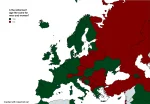Aktywne Wpisy
Zawiera treści 18+
Ta treść została oznaczona jako materiał kontrowersyjny lub dla dorosłych.

pogop +72
Kraje europejskie z równym wiekiem emerytalnym dla mężczyzn i kobiet (na zielono).
#mapy #mapy #mapporn #ciekawostki #europa #emerytura #rozowepaski #niebieskiepaski
#mapy #mapy #mapporn #ciekawostki #europa #emerytura #rozowepaski #niebieskiepaski

źródło: temp_file4923102599457915670
Pobierz




#rozowepaski #logikarozowychpaskow #rownouprawnienie #feminizm #studia #studbaza
źródło: comment_Tv4tIYtN35CvE4JnLHFq5mRbglUybtXR.jpg
PobierzKomentarz usunięty przez autora
Chodzi mi tylko o statystyczny punkt widzenia, nic więcej.